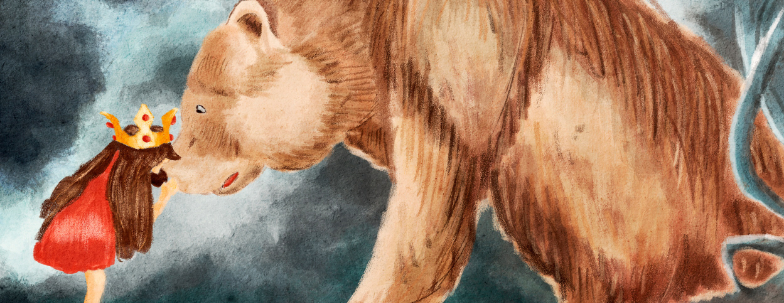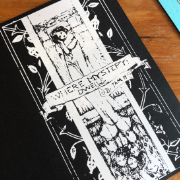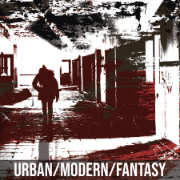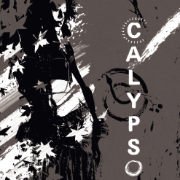The Random Game a Month Exercise RGAME

filed under game design on 27 May 2021
tagged rgame
It’s probably the second shot’s fever making me loopy, but I decided I miss OMGAM (after half a year off. I’ve been really bad about updating them here). But I need more of a challenge and one page games don’t thrill me anymore! So…
The Random Game a Month Challenge
Roll 1d6+1, then roll up that many options from the generators at sadpress or orteil.dashnet. Pick one to be your design seed. Now make it a playable, interesting game, with as many pages as you're inspired to make, and an attractive layout. You have thirty days!
I’m not going to let myself fall into the trap of the last two days crunch; if I don’t have a solid start by the end of week three I’m calling that month a miss. And I’m not going to rush to get one done in the next three days, either. This officially starts in June! Which is good timing because I have a tiny little KS project that’s ready-to-print as soon as symptoms subside.
I rolled a 5, so six options to choose from. I generated half from sadpress and half from orteil.
Theme This looks like a very obviously procedurally generated RPG about finding out what really happened, all those years ago. Getting Started Your character is mainly defined by these 2 attributes. Bitch Knots Spending points lets you act more freely. You begin with 3 points in each attribute. Actions Your 2 attributes, Bitch, Knots, help decide what happens whenever you do something risky. At the start of the game, write down the title of a novel (or you can use films). Apart from trivial minor activities, your character can only do things that somebody in the book does. You also cannot borrow the same moment twice. You can cross out the novel and write a new one by spending a point of the relevant attribute. For example, if a task calls for Bitch, spend a point of Bitch to 'jump' to a new novel where some character does the action you want to perform. You are now borrowing your action from that book until you spend another point. Points are restored at the GM's discretion, usually at the end of each session.
Thoughts: I like this, but the attributes aren't working for me, and the reliance on knowing a novel or film well enough makes me nervous. That said, I can immediately how I'd turn this into a solo game. More of a contender than I thought at first glance.
Theme Welcome to Crystal Castles, a dreamy land of stories and enigmas. You play a party of pioneers. You are exploring a garden city into its seventh year of the siege that lies at the end of the nightingale's song. You have come in search of the monastery of a long-lost Shadow Judge. Getting Started Background Choose one: the snarky healer, the virtuous gambler, the smooth-talking spy, the gleeful tramp, the greedy pirate, the guillable collector, the even-handed scrivener, the noble-born player, or invent a background of your own. Your attributes Each of your attributes is represented by some material object or creature in your field of vision. Physique Training Intellect Agility Constitution Rhetoric At the start of the play session, write a list of what objects represent what attributes. You don't have to show anyone your list. Actions Your 6 attributes, Physique, Training, Intellect, Agility, Constitution, Rhetoric, help decide what happens whenever you do something risky. To succeed in an action, you must improve the object that represents it in some way, or put it to a novel use. Or if it is a creature, you must please them, help them, or teach them something. If the object or creature disappears from where it can be seen, your character's attribute is frozen and useless. You can claim successes from interactions with secret objects or creatures, but if so, near the end of the session everyone must reveal everything, and general consent can render those successes illusory, fleeting, or phyrric. The same object or creature may serve as the attributes of more than one character.
Thoughts: The flavor text is top notch, but the characters feel vaguely Final Fantasy-esque and the stats lean towards the kind of traditional stats someone who earnestly wants to not be making D&D would pick. The action resolution is interesting but the link of "Physique: my drink coaster" seems kind of hard to implement.
Theme This looks like a freewheeling RPG about environmental collapse in Glen Cohnal Syldan. Getting Started Your character is mainly defined by these 2 dice pools. • Quirk • Twerk Each is represented by a dice pool of between 1 and 10 six-sided dice. Roll 2d10 2 times, discarding the lowest die each time. Write each result next to an attribute of your choice. Actions Your 2 dice pools, Quirk, Twerk, help decide what happens whenever you do something risky. When you try something non-trivial, roll the dice pool of the closest associated attribute. Sometimes the GM may remove or add dice to represent penalties or advantages. Roll them one at a time, and stop whenever you like. As you roll, group them into the high rolls and the low rolls. If the high rolls outnumber the low rolls, you succeed. If the two groups of dice are equal, you succeed, but at a cost. The more dice in the high roll group, the bigger the success.
Thoughts: Not much flavor on this and the amusement value on the stats would pall quickly. I like the stat generation, but there's a non-zero chance you end up with a 1, which means you either pass or fail but not complicate. I'd want to crunch the anydice on this one, for sure -- but it doesn't really excite me, though you could do some fun stuff with TN.
Introducing The Local Helm, a tabletop role playing game designed for playing fantasy stories set in a small community. conflict resolution in this game involves rolling a d8 dice pool and adding up the result. Character stats include: Allegiances Paradigm Resources and Alignment
Thoughts: The stats pair well with the concept, but there's not a whole lot here. Definitely a contender just because it's such a blank slate.
Welcome to The Fight vs. The Punk, a tabletop role playing game designed for playing war-themed games set in a cyberpunk world. conflict resolution in this game involves rolling different dice depending on the character's stats (d4, d6, d8, d10, d12, or d20). Character features consist of: Bounty and Virtues/Vices
Thoughts: Nothing about this excites me, though I can see how it might be fun to play a character who is literally a collection of virtues and vices! Okay, I'm excited about that.
Introducing Wake and The Spies, a tabletop role playing game designed for playing spy drama tales set in a dream world. conflict resolution in this game involves rolling a single d20 and adding modifiers. Character features consist of: Wealth Merits and Expertise
Thoughts: Spies, dream world, I like this, but the resolution is boring and the character features, while workable, would need tweaking. I can't see how I'd finish this with more than the first sentence included. Pass.
Overall Thoughts
The only options I’m interested in at all are 1, 4, and 5, but there’s something I like about each. Breaking it down a little further, on pure excitement, I’d say they’re all about tied.
Number 1 seems like the easiest; there’s not much to do here beyond figuring out how I’d rephrase the stats to actually be in context and then laying it out.
I like the small community aspect of number 4, that’s an interest of mine, and I like how easy it would be to put the stats in in a flavorful way. I don’t like how much work I think it’ll be, even if I leverage other systems and tables I’ve got lying around for making people.
Number 5 would be most challenging, as I don’t like war-themed or combat-centered stuff, but I do like the idea of having a box of polyhedral dice and assigning them to virtues and vices – an entire character defined by their Bounty (how much they’re worth dead, how good they are at hunting?) and their virtues and vices.
… I want to make all three of these. The question is, can I? Possibly; I’ll pick one and make it, and see where it goes from there.


